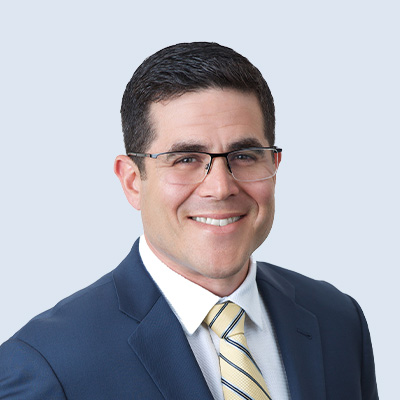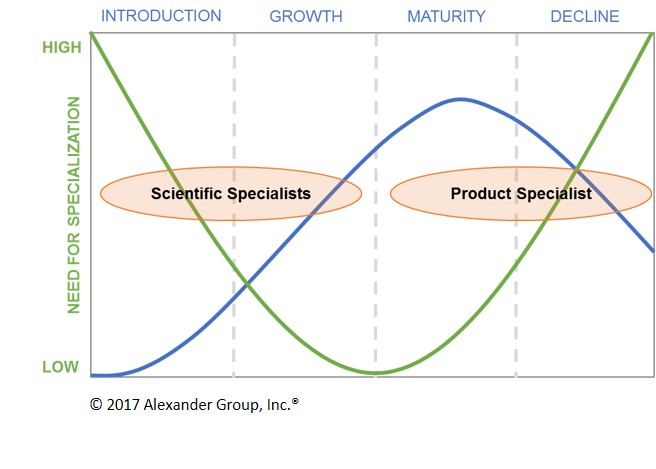Is It Time to Rethink the Technical Sales Specialist Model?

Life sciences and analytical instrument companies often rely on technically savvy sales specialists to deliver top-line revenue goals. On one hand, these highly trained experts are vital to bringing complex, innovative products to market (with end users that demand expert-level education and insights). On the other hand, these specialist resources represent a significant sales expense and create multiple layers of crediting and organizational design complexity. The question is, When does the benefit outweigh the costs of retaining these specialists?
The key lies in understanding the product life cycle (PLC). Maintaining specialist coverage for the life cycle of a product is expensive and potentially growth-limiting. While these highly technical resources are crucial in early stages of growth, they often limit profitable revenue expansion as the product approaches maturity and moves into decline. As a result, sales leaders must continually evaluate the sales coverage needs of their customers and products and thoughtfully deploy resources.
The four phases of the classic PLC framework is useful in evaluating these evolving coverage needs:
- Introduction – The product is new to the market place. The business needs resources that can educate the market and demonstrate the value proposition. Customers need the company to show how the product fits into workflows and delivers desired results.
- Growth – “Early adopter” customers and key opinion leaders successfully utilize the newly established product. The business needs resources that can educate the next wave of adopters and repeat the success by early adopters. Customers are still skeptical and need help seeing how the solution is a better alternative to well-established methods.
- Maturity – Potential buyers understand the product and know the brand. In addition to converting demand (e.g., marketing campaign efforts), the business needs to retain existing business and penetrate new pockets of untapped growth opportunity. Customers need more company support as the volume of requests and asks increases.
- Decline – The product ages into obsolescence and competitive innovation emerges to replace it. The business seeks to maintain base business and free up sales resources to help convert customers to this next generation of technology. Customers perceive significant risk associated with innovation and need sales resources that understand their workflows and can help mitigate risk.
The PLC framework challenges the need for high cost, highly technical, scientifically trained sales specialists outside of the Introduction and Growth phases. It’s not that specialization (in some form) is an inviable late growth stage strategy. In actuality, the company that forgoes specialization may be putting their market position at risk given what some customers value.
Rather, the lens suggests shifting to alternative models, including divesting of the scientific specialist model in the late Growth/early Maturity phases.
Figure A: Product Life Cycle Stages and Sales Specialization Needs Below are alternatives to consider at that time:
Below are alternatives to consider at that time:
- Product Specialists – The roles have a similar pedigree to a generalist account manager; however, their product bag is limited to the line of business in question. While they may not be able to replicate the technical depth of a scientific specialist, they bring the focus needed to ensure market representation. The role is field-based or inside. Product specialists call independently on customers with some communication/coordination with account managers.
- Digital Sales – This tandem digital marketing and inside sales model provides the focus needed to ensure the product is top of mind for customers. Through targeted outbound email campaigns, promos, social and other digital advertising, value propositions reach relevant buyers. Leads are generated based on digital engagement; inside sales responds with outbound call campaigns and supports reactively with inbound customer inquiries.
- Field Marketing – This high-reach role brings product focus by gaining account manager (or channel) mindshare through training, promotions, rebates or other field-deployed marketing programs. These resources emphasize early stage sales pipeline fill rates and collaborate with their field sales colleagues to matriculate opportunities. Additionally, they target and execute local market events to stimulate demand and generate leads that they can hand off to local sales teams (or inside sales for lower value opportunities).
The need for highly technical scientific sales specialists is greatest in the Introduction and Growth phases of the PLC. As customers become more educated, the market matures and the product ages, sales leaders must reevaluate the sales model and identify opportunities to invest in higher productivity resources or better fit-for-purpose models.
Need to reevaluate your company’s coverage model based on PLC framework? The Alexander Group can help. Contact a Life Sciences practice leader for more information about how we help clients reassess and redeploy their specialist teams to increase sales productivity and reduce sales expense.
Learn more about Alexander Group’s approach to life sciences companies’ unique challenges.